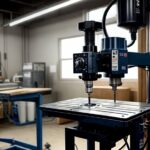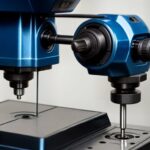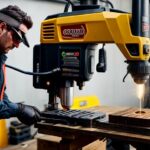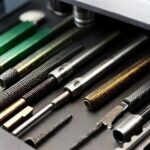If you’re in the market for one, you can’t go wrong with either a WEN or a Ryobi drill press. There is a drill press to suit manufacturers’ needs and budgets. This article will examine the differences and similarities between WEN and Ryobi drill presses to help you make an informed buying decision.
There is a WEN or Ryobi drill press for you, whether you’re a weekend warrior or a professional carpenter. Let’s jump right in!
Comparison chart:
| Feature | WEN | Ryobi |
| Price Range | Affordable | Affordable |
| Motor Power | 5-7 amps | 6-8 amps |
| Speed Settings | Variable | Variable |
| Table Size | 8-12 inches | 9-13 inches |
| Chuck Size | 1/2 inch | 1/2 inch |
| Stroke Length | 2-4 inches | 2-4 inches |
| Weight | Light to Medium | Light to Medium |
| Warranty | 2-Year Limited | 3-Year Warranty |
| Additional Features | LED work light, laser guide | LED work light, laser guide |
| Depth Stop | Yes | Yes |
| Adjustable Table | Yes | Yes |
| Dust Collection | Some models | Some models |
| Fence System | Some models | Some models |
| Spindle Tilt | Some models | Some models |
5 major differences between WEN and Ryobi offer drill presses:
- Warranty: Ryobi’s three-year guarantee is twice as lengthy as WEN’s two-year warranty on its power tools.
- Motor Power: the motors in Ryobi drill presses have a higher average amp draw of 6-8 compared to the 5-7 amps in WEN models.
- Table Size: Compared to WEN drill presses, whose tables are typically 8-12 inches in size, Ryobi models typically feature tables that are 9-13 inches in size.
- Feature Availability: Although both manufacturers provide drill presses with adjustable tables, depth stops, and LED work lights, not all models may have these options. Some WEN drill presses lack features such as a fence or a spindle that may be tilted.
- Reputation: WEN and Ryobi brands have earned a solid reputation for delivering high-quality power tools. The greatest brand for you is the one that meets your requirements and preferences.
WEN Drill press:
PROS:
- They have reasonable pricing, enabling a larger spectrum of clients to purchase them.
- Flexible performance with adjustable speed settings
- For increased precision, use a laser guide and LED work light.
- For a more organized and productive environment, several versions incorporate fencing and dust collecting systems.
CONS:
- Limited to a two-year warranty term
- For heavy-duty applications, motor power may not be enough.
- Some versions don’t have fences or spindle tilting capabilities.
Ryobi Drill Press:
PROS:
- Reasonably priced, allowing a larger variety of clients to purchase them
- Slightly more powerful motors, averaging 6 to 8 amps
- Longer guarantee of three years
- LED work light and laser guide for increased precision
CONS:
Depending on the model, certain features like dust collection or fence systems may not be available, and the table size may not be appropriate for bigger projects.
Similarities:
- First, they’re both reasonably priced; clients can get their hands on one of these drill presses from either manufacturer.
- The WEN and the Ryobi drill presses have variable speed controls that enable the operator to fine-tune the machine’s rotational speed to meet the demands of a given task.
- Thirdly, both manufacturers equip drill presses with LED work lights and laser guides, which help guide the drill with more precision and speed.
- Size 4: Table and Chuck Both WEN and Ryobi drill presses feature standard table and chuck sizes of 1/2 inch, with WEN’s averaging 8-12 inches and Ryobi’s 9-13 inches.
- Fifth, portable and manageable in weight, drill presses from both companies may be found in the lightweight to medium weight range.
- Both the WEN and the Ryobi drill presses come with movable tables, and depth stops, allowing for exact adjustments during usage.
Which brand is better: Wen or Ryobi?
If you don’t know your customer’s individual requirements and preferences, you may not know which brand will best meet their demands. There are advantages and disadvantages to both the WEN and Ryobi drill presses, and the ideal option will ultimately come down to the user’s preferences, needs, and experience level.
WEN might be the greatest alternative for people on a tight budget who want access to basic functionality and variable speed settings. The brand’s drill presses are well-equipped for the price, with LED lighting, laser guides, and adjustable tables among the standard features.
Ryobi may be a better option for people looking for a more powerful motor ready to spend a bit more. The motors of Ryobi drill presses are more powerful than the industry standard, coming in at an average of 6-8 amps and with a 3-year guarantee.
Ultimately, it’s up to the individual user to choose what features are most important to them in a drill press. Before settling on a particular drill press, it is wise to research the available options and compare their features, capacities, and pricing.
Frequently Asked Questions (FAQs)
1. What is the main difference between WEN and Ryobi drill presses?
The main differences between WEN and Ryobi drill presses are motor power, table size, and warranty. Ryobi drill presses have slightly more powerful motors and larger tables than WEN drill presses, and they also come with a longer warranty period (3 years compared to WEN’s 2 years).
2. Are WEN and Ryobi drill presses suitable for beginners?
Yes, both WEN and Ryobi drill presses are suitable for beginners, as they offer a range of features that make them user-friendly and versatile. Their variable speed settings and adjustable tables make them suitable for various tasks, while their LED work lights and laser guides provide added precision.
3. Can I use WEN and Ryobi drill presses for heavy-duty tasks?
While both WEN and Ryobi drill presses are capable of handling a variety of tasks, they may not be suitable for heavy-duty applications. Their motors may not be powerful enough for some demanding tasks, so it’s essential to consider the specific needs of your project before purchasing a drill press.
4. How do I choose between a WEN and a Ryobi drill press?
To choose between a WEN and a Ryobi drill press, consider your budget, specific needs, and preferences. WEN drill presses are typically more affordable and offer basic functionality, while Ryobi drill presses have slightly more powerful motors and a longer warranty. It’s essential to research and compare the features, capabilities, and prices of different models before making a decision.
5. Are there any additional accessories I should consider purchasing with my drill press?
Some additional accessories that can enhance the functionality of your drill press include a dust collection system, a fence system, and a spindle tilt. These features may not be available in all models, so it’s essential to check the specific model you’re interested in and consider whether these accessories would be beneficial for your projects.
Final Words:
Well-known manufacturers like Ryobi and WEN make drill presses that are reasonably priced and feature-rich. Variable-speed drill presses from both manufacturers are available with LED lighting, laser guides, and height-adjustable tables, making them versatile enough for a wide range of jobs.
WEN is well-liked for its low costs and standard offerings, whereas Ryobi is well-liked for its slightly more powerful motors and extended guarantee duration. Budget, needs, and familiarity with the system all play a role in determining the optimal option.
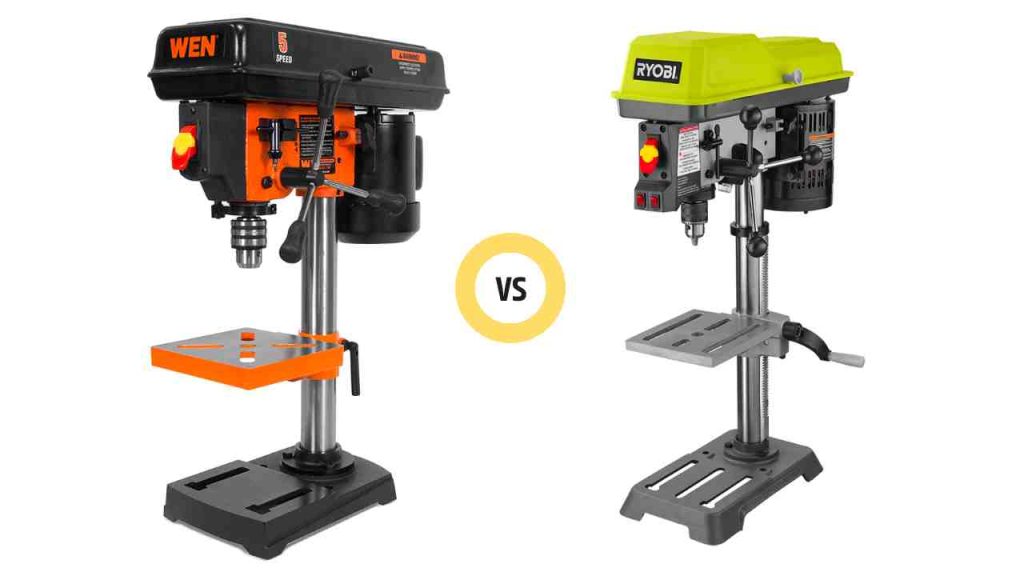 Before making a final decision, you should consider your individual preferences and requirements and compare and contrast the features, capabilities, and costs of various models of WEN and Ryobi drill presses. A drill press is a useful piece of equipment for anybody with a woodworking or DIY hobby or professional woodworkers.
Before making a final decision, you should consider your individual preferences and requirements and compare and contrast the features, capabilities, and costs of various models of WEN and Ryobi drill presses. A drill press is a useful piece of equipment for anybody with a woodworking or DIY hobby or professional woodworkers.
- Where are WEN drill presses made? - April 2, 2023
- Where are Rikon drill presses made? - April 1, 2023
- Where are Powermatic drill presses made? - April 1, 2023


